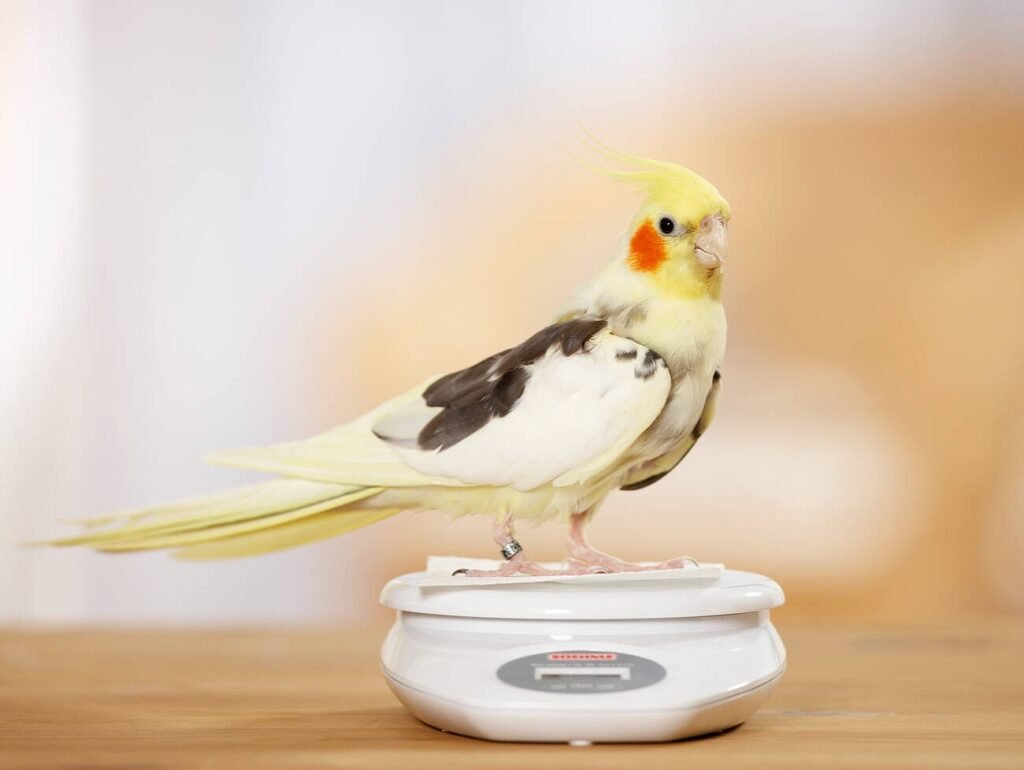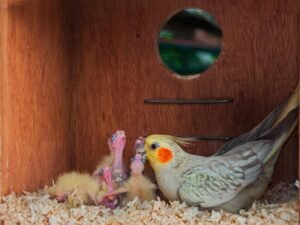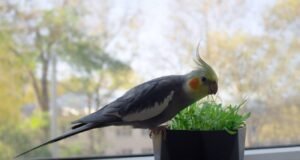How do I monitor my cockatiel's weight?

With over a decade of experience rearing cockatiels, I’ve learned that these delightful birds, with their affectionate nature, distinctive head crests, and playful demeanor, can quickly become cherished members of any household. Ensuring their health and happiness involves more than just regular feeding and interaction; it includes attentive care, particularly when it comes to monitoring their weight. Understanding and managing your cockatiel’s weight is a cornerstone of their overall well-being. In this guide, I’ll share insights from my extensive experience and provide practical tips on how to effectively monitor your cockatiel’s weight, ensuring they remain in top condition.
Why Monitoring Weight is Crucial
1. Health Indicator
Monitoring your cockatiel’s weight is more than just a routine check; it’s a vital health indicator. Significant or sudden changes in weight can signal underlying health issues. For example:
- Infections: Weight loss can be a sign of an infection or disease. If your cockatiel suddenly starts losing weight, it could be due to an illness that requires immediate attention.
- Parasites: External or internal parasites can cause weight fluctuations. Keeping an eye on your bird’s weight helps in early detection and treatment.
- Dietary Problems: Weight changes might indicate problems with their diet. Either they might not be getting enough nutrients or could be consuming inappropriate foods.
2. Nutritional Balance
Maintaining a healthy weight is essential for ensuring that your cockatiel is receiving the right amount of nutrients. A well-balanced diet should support their growth, energy levels, and overall health. Weight monitoring helps:
- Confirm Nutritional Adequacy: By tracking your cockatiel’s weight, you can assess whether their diet is meeting their nutritional needs.
- Adjust Diet as Needed: If weight gain or loss is detected, you can make informed adjustments to their diet to ensure they are receiving balanced nutrition.
3. Breeding Readiness
For those who breed cockatiels, monitoring weight is crucial. A healthy weight is necessary for breeding success:
- Optimal Breeding Condition: Cockatiels that are neither underweight nor overweight are more likely to be in good condition for breeding.
- Successful Rearing: Healthy weight ensures that your cockatiel has the energy and resources needed to successfully rear chicks.
Essential Tools for Accurate Weight Monitoring
To effectively monitor your cockatiel’s weight, you’ll need a few essential tools. Here’s a detailed look at what you need:
1. Digital Gram Scale
A digital gram scale is the most accurate tool for weighing birds. Here’s what to consider when selecting one:
- Precision: Choose a scale that measures in grams with a high degree of accuracy. This ensures precise weight measurements.
- Size: A small, compact scale is ideal for birds. It should fit easily in your home and be portable.
- Features: Some scales come with features like tare functions and perch attachments, which can make weighing easier.
2. Perch Attachment
A perch attachment is a useful feature for a scale, particularly for birds:
- Comfort: A perch allows your cockatiel to feel more comfortable and secure during weighing.
- Accuracy: It helps prevent the bird from moving too much, leading to more accurate readings.
3. Notebook or Digital Log
Keeping a record of your cockatiel’s weight is crucial for tracking changes over time:
- Manual Notebook: A simple notebook can be used to log daily or weekly weights, along with any observations about your bird’s behavior or diet.
- Digital Log: For those who prefer technology, digital logs or apps can simplify tracking and analyzing weight data.
Steps to Weigh Your Cockatiel
Accurate weighing requires a consistent approach. Follow these steps for best results:
1. Choose the Right Time
Weigh your cockatiel at the same time each day to ensure consistency:
- Morning Weighing: Weigh your cockatiel in the morning before feeding. This provides a consistent baseline, as food intake can vary throughout the day.
2. Create a Calm Environment
A calm, quiet environment is essential for accurate weighing:
- Reduce Stress: Ensure there are no loud noises or disturbances that might stress your cockatiel.
- Familiar Surroundings: Weigh your bird in a familiar area to make them feel more comfortable.
3. Tare the Scale
Before placing your cockatiel on the scale, it’s important to tare it correctly:
- Zero the Scale: Turn on your scale and tare it to zero. This ensures that the weight measurements are accurate.
- Use the Perch: If you have a perch attachment, place it on the scale and tare it again. This will account for the weight of the perch and ensure only your bird’s weight is measured.
4. Weigh Your Bird
Place your cockatiel on the scale or perch gently:
- Gentle Handling: Handle your bird gently to avoid startling or stressing them.
- Wait for Stability: Allow your cockatiel to settle on the scale before noting the weight. Movement can affect the accuracy of the reading.
5. Record the Weight
Accurately record the weight in your log:
- Details: Note the weight, date, and any relevant observations about your cockatiel’s behavior, appearance, or diet.
- Trends: Regularly review the recorded data to identify any trends or changes in weight.
Interpreting Weight Changes
Understanding what weight changes mean is crucial for your cockatiel’s health:
1. Gradual Changes
Gradual weight changes are often normal and can be related to:
- Growth: Young cockatiels might show gradual weight increases as they grow.
- Activity Levels: Changes in activity or exercise can lead to gradual weight fluctuations.
2. Sudden Weight Loss
Sudden weight loss is more concerning and may indicate:
- Illness: Rapid weight loss can be a sign of an underlying health issue. Consult a veterinarian if you notice significant drops in weight.
- Stress: Stress or behavioral changes might also cause weight loss. Identifying and addressing the source of stress is important.
3. Sudden Weight Gain
Unexpected weight gain might indicate:
- Overfeeding: Overfeeding or an imbalance in diet can lead to weight gain. Ensure that your cockatiel’s diet is balanced and appropriate.
- Health Issues: Weight gain might also be a sign of health problems, such as fluid retention. A vet consultation can help diagnose the issue.
Maintaining a Healthy Weight
Ensuring your cockatiel maintains a healthy weight involves a combination of diet, exercise, and regular checkups:
1. Balanced Diet
A balanced diet is fundamental for weight management:
- Variety: Include a mix of seeds, pellets, fresh fruits, and vegetables. This provides essential nutrients without excess calories.
- Avoid Overfeeding: Limit high-fat foods and treats to prevent weight gain. Treats should be given in moderation and should not make up a significant portion of their diet.
2. Regular Exercise
Physical activity is key to maintaining a healthy weight:
- Flying Opportunities: Allow your cockatiel to fly freely in a safe, enclosed space. Flight is excellent exercise and helps manage weight.
- Playtime: Provide toys and activities to keep your cockatiel engaged and active.
3. Routine Checkups
Regular veterinary checkups are important for overall health:
- Annual Exams: Schedule yearly visits with an avian vet to monitor your cockatiel’s health and weight.
- Professional Guidance: Your vet can provide expert advice on diet, exercise, and any weight-related concerns.
Common Weight-Related Issues
Being aware of common weight-related issues helps in early detection and management:
1. Underweight Birds
An underweight cockatiel may appear thin and have a prominent keel bone. Possible causes include:
- Malnutrition: Ensure your cockatiel’s diet is rich in essential nutrients.
- Illness: Weight loss can be a sign of illness or parasites. Consult a vet to address the underlying cause.
2. Overweight Birds
Overweight cockatiels may have difficulty flying and show fat deposits. To manage this:
- Diet Adjustments: Reduce high-fat foods and monitor portion sizes.
- Increase Exercise: Encourage more physical activity and playtime.
Conclusion
Regularly monitoring your cockatiel’s weight is a simple yet crucial aspect of their care. By using the right tools, following a consistent weighing process, and interpreting weight changes accurately, you can keep track of your bird’s health and address any issues promptly. Combine weight monitoring with a balanced diet, regular exercise, and routine veterinary checkups to ensure your cockatiel remains happy and healthy.
Your dedication to monitoring and managing your cockatiel’s weight plays a vital role in their overall well-being. Remember, a healthy bird is a happy bird, and with attentive care, your cockatiel will thrive and continue to be a cherished companion for years to come.



